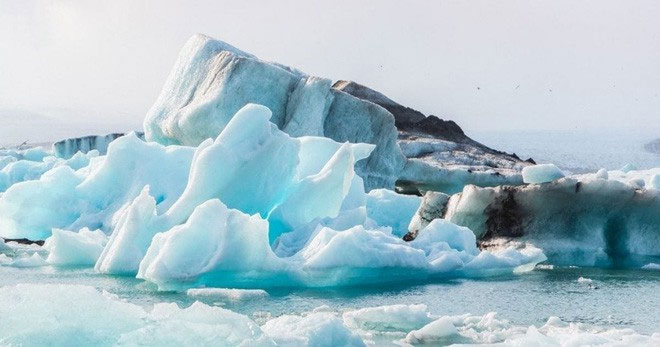Detecting huge amounts of nuclear stored in Earth's glaciers
The most recent study presented at this year's European Union of Scientific Geological Union shows that radioactive debris stored in glaciers can actually become a time bomb.
The area of Earth's glaciers is shrinking quickly. Recent research shows that ice melting speed is 18% higher than previously predicted and 5 times its speed in the 1960s.
This phenomenon has caused many consequences: destroying polar bear habitat; causing sea level to rise; climate change in a bad direction; and make ancient diseases reappear.
And now, the melting of the glacier has come up with another problem that worries us. It was a large amount of nuclear dust buried in Earth's giant ice sheet.'Radioactive iceberg' sounds like a cunning plot behind the earth disaster in Geostorm. And yet, the most recent study presented at this year's European Union of Scientific Geological Union shows that radioactive debris stored in glaciers can actually become a time bomb.

The amount of cryoconite in glaciers can accumulate radiation to potentially dangerous levels.
The main researcher, Caroline Clason, from Plymouth University, said: 'Previous studies on nuclear accidents only focus on their impacts on human health and ecosystems in the area is not frozen. But evidence suggests that the amount of cryoconite in glaciers can accumulate radiation to potentially dangerous levels. '
This is the first time an international team of researchers has begun to analyze the nuclear content of glaciers in the Arctic and Antarctic ; simultaneously in the Alps, the Caucasus Mountains, British Columbia and Iceland. The level of artificial radioactivity was surveyed in 17 locations. The result is an average of 10 times (or more) of radioactive substances in the glacier compared to locations that are not glacial.
The explanation for this result is the spread of radioactive particles after nuclear disasters like Chernobyl or Fukushima. These particles are light and can fly very far.
Normally, they return to the ground in the form of acid rain, where they can be absorbed into the soil or consumed by plants. Therefore, the radioactivity levels are higher in places like Chernobyl and Fukushima. At the same time, the rate of cancer, increased infertility rate and the existence of radioactive pigs. However, a part of this particle will fly to the poles, where they fall in the form of snow, fall on ice, create heavy sediments and accumulate at denser concentrations.
The team analyzed nuclear components in the glacier. And they not only found nuclear dust from the Chernobyl and Fukushima disasters, but they also found materials from decades of testing other nuclear weapons.
Clason said: "We are talking about weapons testing from 1950 and 1960 onwards, the period of developing bombs and heavy weapons."
Although research has shown that radioactive material in the food chain is certainly not good for us, the team still does not know what the presence of this fallout means. The team hopes to find its impact.
"The concentration of very high radionuclides has been found in some recent field studies, but we still don't know their exact impact. We are embarking on a partnership to solve this problem, because obviously, this is a very serious problem for the downstream environment and the downstream community, we need to find any intangible threat they may encounter. Future".
- The world's most dangerous glacier is about to melt, catastrophic with Earth?
- Glaciers in Asia are unusually bloated
- Mars may have existed glaciers
- The Andes glaciers narrowed the record
- Warning of glaciers in Peru is likely to disappear
- Glaciers on Mount Mont Blanc are at risk of collapse
- Conceptual design of large plutonium nuclear reactor
- Afghanistan is richer than we think
- 20% of Canadian glaciers disappeared in this century
- Himalayas glaciers have been flawed for the past 40 years
- The world's fastest melting glaciers through satellite images 30 years apart
- The first glacier in the world officially 'died' in the era of climate change
 'Fine laughs' - Scary and painful torture in ancient times
'Fine laughs' - Scary and painful torture in ancient times The sequence of numbers 142857 of the Egyptian pyramids is known as the strangest number in the world - Why?
The sequence of numbers 142857 of the Egyptian pyramids is known as the strangest number in the world - Why? History of the iron
History of the iron What is alum?
What is alum?